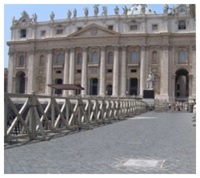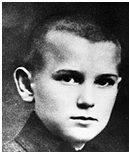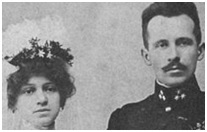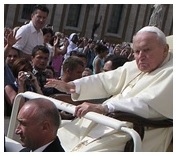|
 |
|
 |
|
|
||
John Paul II Leadership
John Paul II (1920-2005)
The ‘people’s Pope’, born Karol Wojtyla in Poland, who spoke up defiantly against communism, war and immorality. His influence extended far beyond the Roman Catholic Church, which he (pictured right) led after his election as Pope in 1978.
Why was he a great leader?
1. Purpose and principle He lived to love and encourage people to believe in God and Jesus, so that they could enjoy peace, happiness and salvation. But he never saw himself as a reformer, being always opposed to
2. Determination and courage He had to overcome many problems:
3. Sacrifice He gave up everything to serve God and other people:
So he was a servant leader and his motto was “totally yours”.
4. Tough but tender John Paul (pictured right aged 12) steadfastly held onto his beliefs and told people to believe in them. But he was also an incredibly kind man who inspired everybody with his personal and informal style of leadership.
5. Putting his principles into action He wasn’t a hypocrite. People loved him, because he did what he said with the greatest humility. He never saw himself as the ‘big boss’ of the Catholic Church, but the selfless servant of God and his people. He distinguished between the two sides of human nature:
He strenuously strove to be a better person, and he wanted everybody to do the same, urging people to build a better future now.
6. Lifelong learning He learned continually from
i.e. the person you are is dependent on your relationships with others. He read or listened to other people’s views, and then made a decision based on what he thought God wanted. 7. Communication His speeches were always moving, and his love and integrity shone through. On his visit to Galway in Ireland in 1979 (pictured rght), these words prompted 12 minutes of sustained cheering: “Young people of Ireland, I love you”.
8. Hard work Rising at 5.30, he worked an 18 hour day, until his bedtime at 11.30 p.m. 9. Visibility He didn’t lock himself away in the Vatican, but went out to see people all over the world motoring around in his Popemobile (pictured right in 2004). Only six months after his election as Pope, he made his first visit to his homeland, Poland, as a gesture of support for its struggle for freedom against communism.
10 Tolerance He believed in acceptance of other religions, being the first Pope to enter a mosque.
Key quotes on love Hatred can only be conquered by love Anything done for another is done for oneself
Key quotes on stress and pain Do not abandon yourselves to despair. The worst prison would be a closed heart.
Key quote on war War is a defeat for humanity.
Key quote on learning and wisdom The truth is not always the same as the majority decision.
Key quote on science and religion Science can purify religion from error and superstition.
Key quote on change Have no fear of moving into the unknown. |
|
|
||
|
|
||
| Copyright © wisdomtowin.com 2025 All Rights Reserved | ||
|








